A Conversation With Mike Birbiglia and Jacob Jaffke (SLEEPWALK WITH ME)
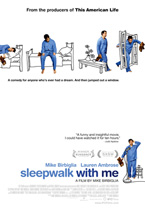 (Sleepwalk With Me is now available on DVD, Blu-ray, and at Amazon Instant through MPI Home Video.)
(Sleepwalk With Me is now available on DVD, Blu-ray, and at Amazon Instant through MPI Home Video.)
As a stand-up comedian, author, and contributor to the popular NPR radio show This American Life, Mike Birbiglia has proven that he has a knack for personal storytelling that connects with all types of audiences. In making his feature film debut as a writer, director, and actor, Birbiglia makes an endearingly smooth transition to the big screen. Sleepwalk With Me is a “crowd-pleaser” in the very best sense of the term, a funny and honest tale about learning to live with one’s deficiencies (and, in his case, to use them to his advantage). On the day after the film’s world premiere at the 2012 Sundance Film Festival (where it cemented its crowd-pleaser status by taking home the “Best of NEXT!” Audience Award), I sat down with Birbiglia and producer Jacob Jaffke—fellow producer Ira Glass must have been skinny dipping in a hot tub somewhere—to discuss his transition from the stage to the director’s chair, and how they made this movie happen. (Distributed by Sundance Selects, Sleepwalk With Me opens theatrically in New York City on Friday, August 24, 2012, followed by more cities in the coming weeks. Go here to learn more.)
Hammer to Nail: What language would you describe how it felt to sit through your world premiere last night?
Mike Birbiglia: It was gut-wrenching and anxiety-instilling and exciting. I was clenching my wife’s hand the whole time. When something would get a laugh I’d release her hand, and when something wasn’t getting a laugh I’d squeeze harder.
H2N: Well it’s fair to say that it started incredibly well, which must have helped.
MB: We had a laugh right out of the gate that was really, really strong. And I was very, very happy with that. I was thrilled with how the film was received, but we had never put it in front of 500 people before. We had done these test screenings in New York that Jacob organized with This American Life, which had about 60 or 70 people in each. But it was nothing like having it front of 450 people.
H2N: Were all of those test screenings with people who were already tapped into This American Life and therefore had some sense of what they were getting into? Or did you do show it to any random audiences in, say, the middle of Jersey?
Jacob Jaffke: We wanted to. We just didn’t have the time or the money. With the This American Life network, it was there, it was accessible to us, so given our time-frame we had to take advantage of it. We did try to select people who had different occupations or were from different age groups, but for the most part they were familiar with the show and with Mike.
MB: One of the things we were really proud of, building on what Jacob was saying, was that people of different age groups really liked the film. Ira showed his whole family over Thanksgiving, and he came back and he was like, “I showed it to people who were, like, 85 years old, and people who were, like, 12 years old, and they all loved it!” [H2N laughs] That’s my goal with my one-man shows as well. There are certain things that you don’t have to do, but which alienate certain demographics. Like, I always try to not curse, not because I don’t curse in real life or I don’t enjoy things with cursing in them. Just because there’s a certain generation of people who, when they hear curses, their ears close. They block out the next 15 seconds of sound, and I’m like, “Well, I don’t want that to happen during the movie.” That’s not worth it to me. It doesn’t offend me, but if people are gonna block out the sound, then fuck it. [all laugh]
H2N: Our site is different from others in that almost all of the contributors make movies themselves, so I’m interested to find out if filmmaking was a longtime goal of yours, or was it a later epiphany, an extension of your stand-up?
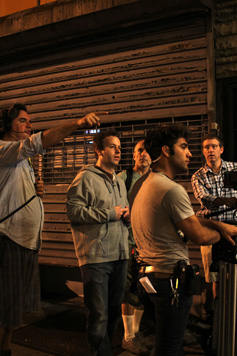 MB: I’ve wanted to make films since I was about 18 years old. I started studying screenwriting and I directed and acted in a couple short films in college. Jacob and I have talked about this at length, because he has a few of these under his belt as well, but I was so destroyed by the process—financially and emotionally—and so dispirited by it that I was like, “I can’t do this again. I can’t continue to have a job where I have to pay someone thousands of dollars to do the job. That’s not a job. That’s the opposite of a job.” [H2N and JJ laugh] I went into stand-up because there’s no overhead. Sometimes literally—you perform outdoors. [all laugh] It’s a microphone—sometimes no microphone—and it’s one person standing in front of a group of people: four people, ten people, sometimes a thousand people, two thousand. But there’s no overhead, and I basically developed my style of comedy with no budget. And then, you know, in the last few years, people have been interested in developing projects with me and I’m like, “I wanna make a movie. That’s what I really wanna do. I don’t wanna make a sitcom. I’ve been through that development process and that kind of stuff. I don’t wanna do that. I wanna make a movie.” People said, “You don’t know how to make a movie,” and I was like, “I’ll figure it out.”
MB: I’ve wanted to make films since I was about 18 years old. I started studying screenwriting and I directed and acted in a couple short films in college. Jacob and I have talked about this at length, because he has a few of these under his belt as well, but I was so destroyed by the process—financially and emotionally—and so dispirited by it that I was like, “I can’t do this again. I can’t continue to have a job where I have to pay someone thousands of dollars to do the job. That’s not a job. That’s the opposite of a job.” [H2N and JJ laugh] I went into stand-up because there’s no overhead. Sometimes literally—you perform outdoors. [all laugh] It’s a microphone—sometimes no microphone—and it’s one person standing in front of a group of people: four people, ten people, sometimes a thousand people, two thousand. But there’s no overhead, and I basically developed my style of comedy with no budget. And then, you know, in the last few years, people have been interested in developing projects with me and I’m like, “I wanna make a movie. That’s what I really wanna do. I don’t wanna make a sitcom. I’ve been through that development process and that kind of stuff. I don’t wanna do that. I wanna make a movie.” People said, “You don’t know how to make a movie,” and I was like, “I’ll figure it out.”
H2N: You showed them your student shorts and they were like, “Oh, wow!”
MB: Yeah… they didn’t get to see that. That was not available. [all laugh] That was only available upon request. But Jacob had a similar thing where, you’ve probably wanted to make films since you were 18 years old as well…
JJ: Yeah.
MB: And probably been beaten around a bit as well.
JJ: Yeah. Chewed up, spit out as many times as you can be. And you just keep slugging through it. I was a butcher, I was a Walgreens manager… all the while, I’m like, “How did I get here? I went to NYU and I’m cutting meat in South Carolina?”
H2N: Did you study film?
JJ: Yeah. I noticed one of the things I was better at was—sorta like how Mike came to realize—while I wanted to write and direct my own movies, when I was doing my own films I had this knack for production. The things I was always focusing on were like, “What time is everybody eating lunch? Do we have enough money to get this piece of equipment?” Or whatever, “Is the crew happy?” Or…
MB: “Is there actually gonna be a hot air balloon?” [laughter] “Or is it gonna be a model?”
JJ: Exactly. Just that kind of stuff. So I started focusing more on producing, trying to find directors and writers to work with. So I went into production and learned the ropes through production coordinating and managing.
MB: And then with us, originally Alicia Van Couvering was producing our film, and she had just come off of Nobody Walks and was frankly just so tired.
H2N: I bumped into her in the West Village when she had literally just gotten back from LA after that and she was totally exhausted.
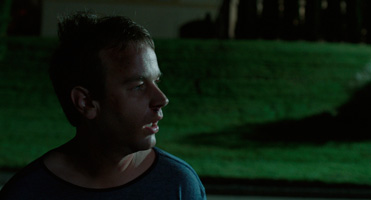 MB: She said to me, “I can’t produce your film anymore. I don’t know what I’m gonna do, I gotta take time off.” And it was really emotional and intense, and she recommended Jacob. And I met with Jacob. We hit it off right away. We had lunch, it was me and Jacob and my production company, Mike Lavoie and Carlee Briglia, and we brought Jacob on as a line producer, but probably about two weeks in it became clear to me and Ira Glass that, “Oh no, he’s the producer!” [all laugh] “This is absurd, the idea that he is under us in any way, he knows so much more about making a film.” And so we just said, “You and Ira are the producers from now on.” And I think Jacob was happy about that.
MB: She said to me, “I can’t produce your film anymore. I don’t know what I’m gonna do, I gotta take time off.” And it was really emotional and intense, and she recommended Jacob. And I met with Jacob. We hit it off right away. We had lunch, it was me and Jacob and my production company, Mike Lavoie and Carlee Briglia, and we brought Jacob on as a line producer, but probably about two weeks in it became clear to me and Ira Glass that, “Oh no, he’s the producer!” [all laugh] “This is absurd, the idea that he is under us in any way, he knows so much more about making a film.” And so we just said, “You and Ira are the producers from now on.” And I think Jacob was happy about that.
JJ: I was very happy about that.
MB: It seemed appropriate, and was very in line with the style and approach that we came at the film, which was a very improvisational approach. “Yeah, Jacob’s the producer now!”
H2N: The reason I asked about your film background is that there are a lot of cinematic flourishes. I’m thinking especially of the long take in the hotel, which is a very complicated thing to do. At what point in the production was a creative decision like that made? As early as pre-production? Was it storyboarded?
MB: Yeah. Our cinematographer Adam Beckman shot the This American Life TV series. He’s been shooting commercials and television for many, many years. Some of those original rap videos. He shot everything.
H2N: I’m a big fan of those early rap videos.
MB: Naughty by Nature. I would talk to him for hours about those videos. He shot the second season of The Real World.
H2N: Nice resume!
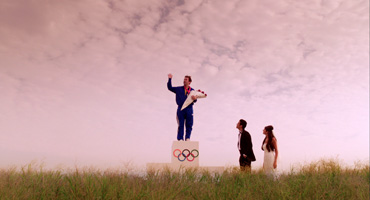 MB: Some really crazy stuff. And he was friends with Ira, so we brought Adam on. We would go to the locations. We had the luxury of going to some of these locations, thanks to Jacob and our locations manager, Chris Menges, who gave us time to go in and photo-storyboard some of these places. I’d say it has a more cinematic look than some films of a comparable budget. The shot you’re talking about in the hallway, it was very hard to organize!
MB: Some really crazy stuff. And he was friends with Ira, so we brought Adam on. We would go to the locations. We had the luxury of going to some of these locations, thanks to Jacob and our locations manager, Chris Menges, who gave us time to go in and photo-storyboard some of these places. I’d say it has a more cinematic look than some films of a comparable budget. The shot you’re talking about in the hallway, it was very hard to organize!
JJ: We had an amazing crew that helped us pull that one off, for sure.
MB: T.J. Alston and John Shim were our key grip and gaffer, and we were so lucky to have them.
JJ: They allowed us to do stuff like that, and that’s why we were able to take those types of chances.
H2N: Not to be too Brooklyn nerdy, but how were you guys able to shoot at Union Hall? I know that’s a stand-up spot, but that seems like you had to literally close the bar and take over to pull that off, right?
MB: Yeah. We had 2am call times thanks to Jacob Jaffke! [JJ laughs] We couldn’t afford it during business hours. The moment they closed, we opened.
H2N: How many nights did you do there?
MB: Three. Two-and-a-half.
JJ: No, it was three.
MB: No, two-and-a-half, ‘cause exterior was on the third day.
JJ: Right. But it was still a two o’clock call time so I consider it a full day of work! But two-and-a-half days at the location.
MB: So I was going to bed at 5pm or 6pm, waking up at 1am… I have a serious sleep disorder. [all laugh]
JJ: I was trying to get some authenticity into the process.
MB: I should point out that I have a serious sleep disorder and my wife would be going to bed at 1am, and she would wake me up. She’d be so sweet, ‘cause she’d make me coffee and be like, “Alright, you’re goin’ to make your movie again!” And it was grueling. It was absolutely grueling. But Union Hall has been a friend of mine for many years, and we really appreciate them helping us, because I really feel it gives the film an authenticity.
H2N: Exactly. That’s just one of the many reasons why low-budget films have such a chip against them. Union Hall is actually where that stuff is going down, and I’d argue that it adds a level of credibility even for the viewers who have no idea where you are. So I responded to it on that level, sensing that you guys had gone that extra mile to preserve that sense of authenticity and reality.
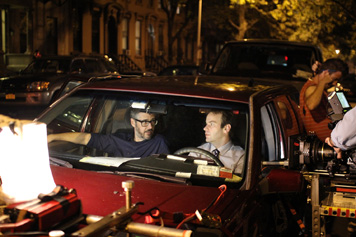 JJ: We made a conscious decision. We were like, “It’s gonna cost more than we want it to, it’s gonna be two o’clock in the morning when we get there, is this really something we wanna do?” And I think place is integral to how Mike came up and is important to the story, so it couldn’t be anything other than Union Hall.
JJ: We made a conscious decision. We were like, “It’s gonna cost more than we want it to, it’s gonna be two o’clock in the morning when we get there, is this really something we wanna do?” And I think place is integral to how Mike came up and is important to the story, so it couldn’t be anything other than Union Hall.
MB: We kept talking about other places because we were like, “It’s so hard and so expensive and it sucks!” But the truth is, for the story, it was really important that Brooklyn symbolized a certain thing for Matt Pandamiglio, which was a place where he was at a certain level, a very low level. And everything around him is glossy and nice, and everybody looks cool and it’s kind of lush. And then he goes on the road and it’s gritty and it’s hard and it’s junky. His status isn’t “high,” but it’s at least respectable. People treat him with some respect and he’s almost given a new chance, a second chance at his own life. So the visual contrast between Union Hall and the road, which is very handheld and gritty, was very important to us.
H2N: As a comedian, you’re always refashioning and reworking your material; you have the ability to do that. But in a case like this, you have to picture lock when you get the call from Trevor! So the tinkering has to end at some point. I’m wondering if, or how, your stand-up informed you when you got into the editing room.
MB: Absolutely. Ira and I, both of us have a process that is very trial-and-error based. I’ll write jokes in a day and then put them on stage that night. Ira will work on interviewing someone on Monday or Tuesday and it’ll air on Friday… on national radio.
H2N: He cuts it that close?
MB: Oh yeah. Big time. I’d be reluctant to speak for him, but I would say there are instances where they interview someone Thursday and it goes out Friday. It’s very important for my process… we were really fortunate to get our editor, Geoffrey Richman. We almost lost him to another film at the eleventh hour. And if we hadn’t had Geoff, we wouldn’t have the film that we have. In a similar way to my and Ira’s background, which is just trial-and-error, trial-and-error, Geoff has that cinematically in spades. Even way beyond our comfort level. Day one, he would go, “What if we put the scene from minute 70 into minute three?” We were like, “Whoa. Can’t we just focus on the thing that we shot? Let’s think about this and spend some time!” Geoff loves editing and he loves bending your brain and thinking in new ways, and it really expanded the way I think about film, and I think Ira and Jacob as well.
H2N: It makes you less precious.
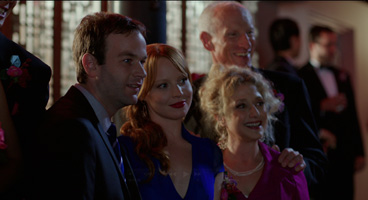 MB: Absolutely. I think part of it is that he did Murderball and Sicko and The Cove. And in documentary, there are just no rules. You can do anything. And he had that approach with this narrative feature. He was like, “We can do anything, we can do anything we want. We want to fix this? Here’s five solutions. You want to feel more emotion here? What if we put the beginning of the scene at the end of the scene and put the middle at the beginning…” He would just twist things around and then we’d go, “Oh, that didn’t work, let’s try something else.” Just literally until the final moments before picture lock!
MB: Absolutely. I think part of it is that he did Murderball and Sicko and The Cove. And in documentary, there are just no rules. You can do anything. And he had that approach with this narrative feature. He was like, “We can do anything, we can do anything we want. We want to fix this? Here’s five solutions. You want to feel more emotion here? What if we put the beginning of the scene at the end of the scene and put the middle at the beginning…” He would just twist things around and then we’d go, “Oh, that didn’t work, let’s try something else.” Just literally until the final moments before picture lock!
JJ: And then also, from my eyes, I come from a line producer background, so when I finish a movie I’m like, “Oh, we’re like 80% done with this thing,” and then we get into post and I’m like, “Oh, we’re like 40% done with this movie.”
H2N: When did you picture lock?
MB: December 23rd.
JJ: We all were on our way home for Christmas, and we worked all night.
MB: Good luck with that. [all laugh] Jacob said to me in, like, September, he goes, “You know, you’re not gonna get Christmas and Thanksgiving,” and I go, “Yeah,” and then we got to Thanksgiving and Christmas and I was like, “Oh yeah, he was right about that.”
H2N: You got the Sundance call Thanksgiving week, yes?
MB: Something like that. From Trevor. I’d say it’s probably the most exciting moment of my life. It’s the least funny thing to describe to people. There’s nothing funny about when good stuff happens.
H2N: “It was just wonderful!” Just talk for an hour like that, a crowd would really love that.
MB: It’s like comedians go soft when they get older. They get money and it’s like, “This guy’s not funny anymore!” But, no, I can’t express how proud I felt about being a part of this unbelievable collaboration between so many people. It was one of these where, if it weren’t for Jacob and Ira and Seth Barrish [co-director] and Adam Beckman and Geoff and 40 or 50 more people, it just wouldn’t be the movie that it is. It just wouldn’t. It’s one of those movies that’s a little bit of a miracle. I feel like that’s the nature of independent film. When you see a good independent film, it’s a little bit of a miracle.
— Michael Tully








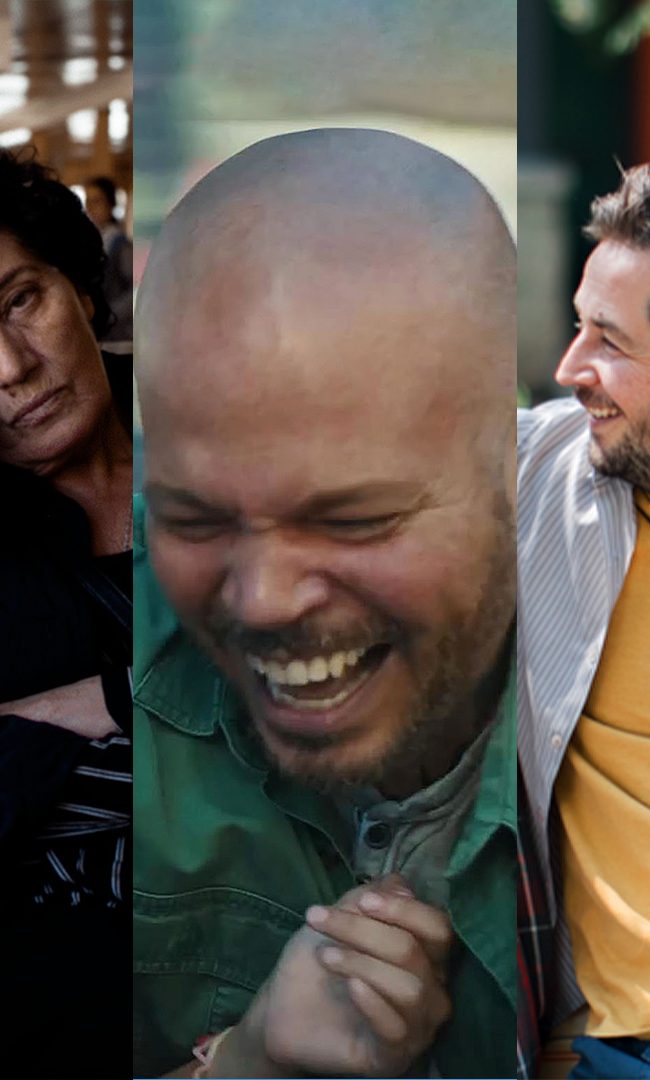
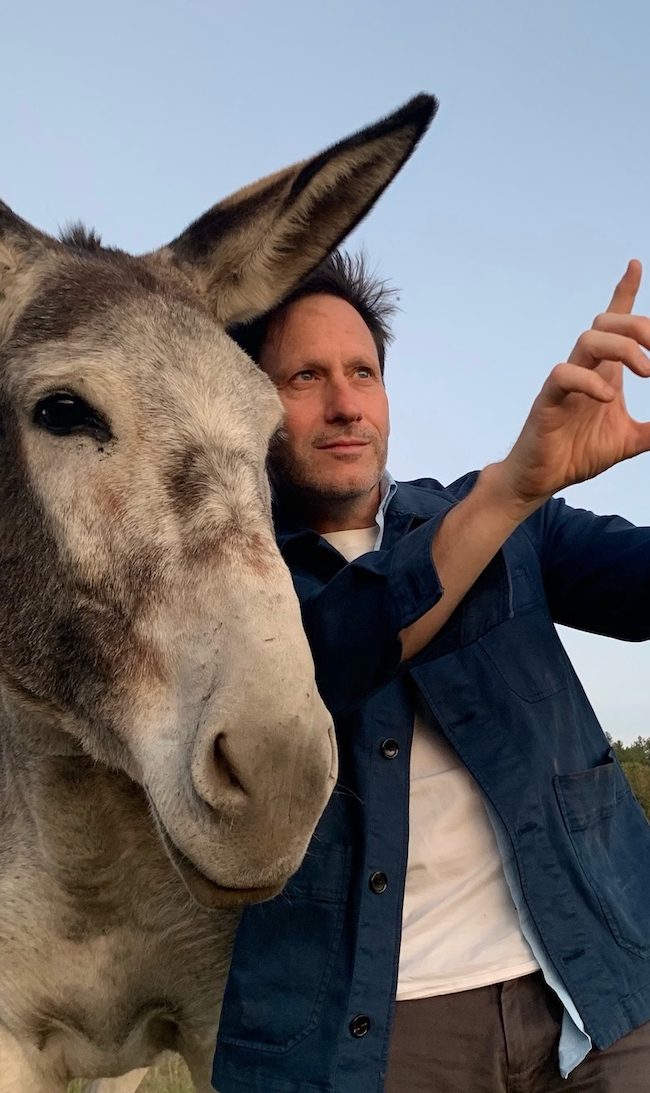


Pingback: HOME VIDEO PICKS – Hammer to Nail